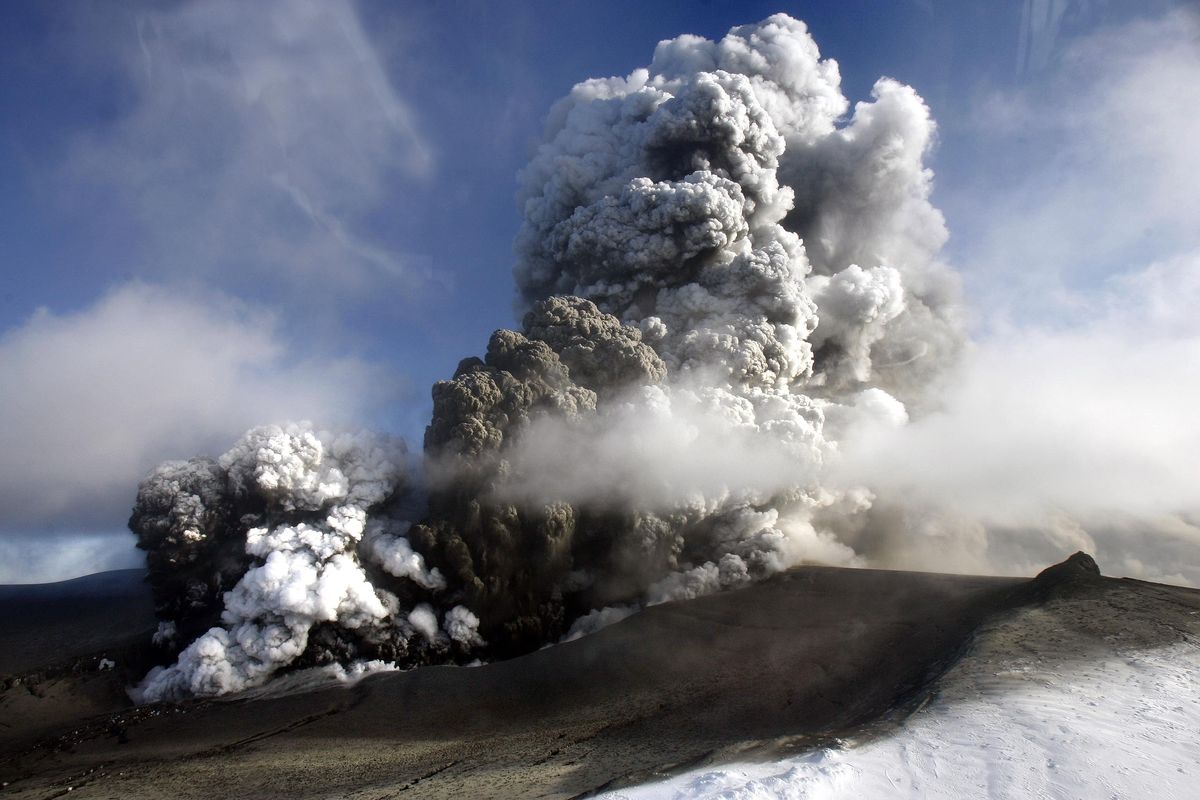Planes test gritty skies
Ash plume plagues frustrated carriers

LONDON – Their losses deepening, European airlines on Sunday stepped up pressure to reopen the skies by carrying out passenger-free test flights despite the layer of volcanic ash that kept most planes across the continent grounded for a fourth day.
Airlines in Germany, the Netherlands and France sent jets close to or into the plume of ash and dust thrown up by the Eyjafjallajokull volcano in Iceland, in bids to demonstrate that flying conditions over Europe were safe. All the flights landed without incident, they said.
There was no indication, however, that aviation authorities would immediately ease restrictions on European airspace. Officials said new wind patterns could disperse some of the ash cloud and allow more regularly scheduled flights to operate today, but thousands of stranded passengers and affected businesses braced for the ban on air travel to extend into the new week.
British Airways canceled all service today into and out of London. Lufthansa also announced the cancellation of all of its flights worldwide today. The French government said airports in northern France, including Paris, would remain closed until at least Tuesday morning.
Except for a handful of flights allowed where a gap appeared in the cloud of ash, no-fly zones were in force in all or part of 24 countries on the continent Sunday, the Europe-wide aviation agency Eurocontrol reported. The list included southern nations like Spain that had hitherto escaped restrictions but are now being hit as the high-altitude grit drifts farther south and east.
Eurocontrol said only 4,000 flights out of a usual 24,000 through European airspace were expected Sunday, the fewest since widespread disruptions first began Thursday. About 63,000 flights have been canceled since then.
Airlines desperate to resume business called on aviation regulators to reassess their flight suspensions, especially in light of the test flights in and around the ash cloud to gauge whether the dust would clog engines or compromise safety.
“The eruption of the Icelandic volcano is not an unprecedented event, and the procedures applied in other parts of the world for volcanic eruptions do not appear to require the kind of restrictions that are presently being imposed in Europe,” said a joint statement issued by associations representing airlines and airports in the region.
Siim Kallas, vice president for transport for the European Commission, told reporters in Brussels safety remained paramount, but that aviation officials would examine the evidence from the experimental flights and try to find solutions “to ease the sufferings of thousands and thousands of passengers.”
“It is clear that this is not sustainable. We cannot just wait until this ash cloud dissipates,” Kallas said.
He said new forecasts showed winds picking up and possibly dispersing more of the sluggish ash cloud to allow more flights today, perhaps as many as half of those regularly scheduled. Yet even as he spoke, the Eyjafjallajokull volcano continued to erupt, belching grit and tiny particles of glass miles into the air.
On Sunday, Dutch airline KLM said it had received permission to fly several planes stuck in Duesseldorf, Germany, back to Amsterdam one by one, starting Sunday morning. The planes carried only crew members.
“These are test flights,” KLM chief executive Peter Hartman said in a statement. “This does not mean that normal air traffic has been resumed.”
The return of the marooned aircraft followed a KLM test flight Saturday evening in Dutch airspace, in which a Boeing 737-800 airliner reached an altitude of 41,000 feet, the maximum allowed for that type of jet. An inspection afterward “revealed that no problems had been encountered and that the quality of the atmosphere is in order,” the airline said.
Air France launched a test flight from Paris to the southern city of Toulouse on Sunday.
“Conditions during the flight were normal,” the airline said. “Visual inspections did not show any damage.”
Four other test flights by the airline were scheduled, including one in southwest France.
In Germany, Lufthansa successfully flew 10 of its planes Saturday without passengers on low-altitude flights. In addition, Frankfurt Airport, one of the world’s busiest, opened for a few hours Sunday afternoon for flights heading north or east because of a break in the ash cloud, Reuters reported.